Mises, Ludwig von. Human Action: A Treatise on Economics
Подождите немного. Документ загружается.

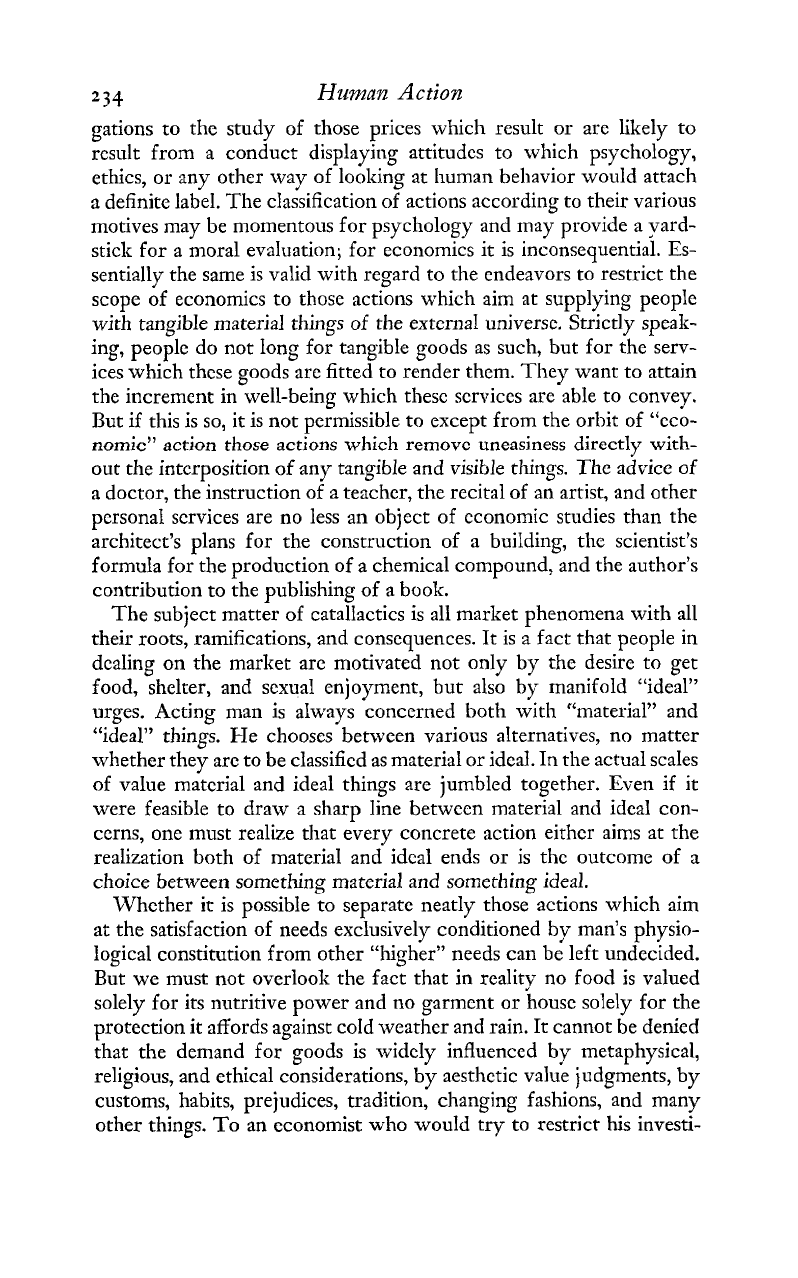
234
Human
Action
gations to the study of those prices which result or are likely to
rcsult from a conduct displaying attitudes to which psychology,
ethics, or any other way of looking at human behavior would attach
a definite label. The classification of actions according to their various
motives may be momentous for psychology and may provide a yard-
stick for a moral evaluation; for economics it is inconsequential. Es-
sentially the same is valid with regard to the endeavors to restrict the
scope of economics to those actions which aim at supplying people
with tangible material things of the external universe. Strictly speak-
ing, people do not Iong for tangible goods as such, but for the serv-
ices which these goods are fitted to render them. They want to attain
the increment in well-being which these services are able to convey.
Rut if this is so, it is not permissible to except from the orbit of "eco-
nomic" action those actions which removc uneasiness directly with-
out the interposition of any tangible and visible things. The advice of
a
doctor, the instruction of
a
teacher, the recital of an artist, and other
personal services are no less an object of economic studies than the
architect's plans for the construction of a building, the scientist's
formula for the production of a chemical con~pound, and the author's
contribution to the publishing of a book.
The subject matter of catallactics is all market phenomena with
all
their roots, ramifications, and consequences. It is a fact that people in
dealing on the market are motivated not only by the desire to get
food, shelter, and sexual enjoyment, but also by manifold "ideal"
urges. Acting man is always concerned both with "material" and
"ideal" things. He chooses between various alternatives, no matter
whether they are to be classified as material or ideal. In the actual scales
of value material and ideal things are jumbled together. Even if it
were feasible to draw a sharp line between material and ideal con-
cerns, one must realize that every concrete action either aims at the
realization both of material and ideal ends or is thc outcome of
a
choice between something material and something ideal.
Whether it is possible to separate neatly those actions which aim
at the satisfaction of needs exclusively conditioned by man's physio-
logical constitution from othcr "higher" needs can be left undecided.
But we must not overlook the fact that in reality no food is valued
solely for its nutritive power and no garment or house solely for the
protection it affords against cold weather and rain. It cannot be denied
that the demand for goods is widely influenced by metaphysical,
religious, and ethical considerations, by aesthetic value judgments, by
customs, habits, prejudices, tradition, changing fashions, and many
other things.
To
an cconomist who would try to restrict his investi-
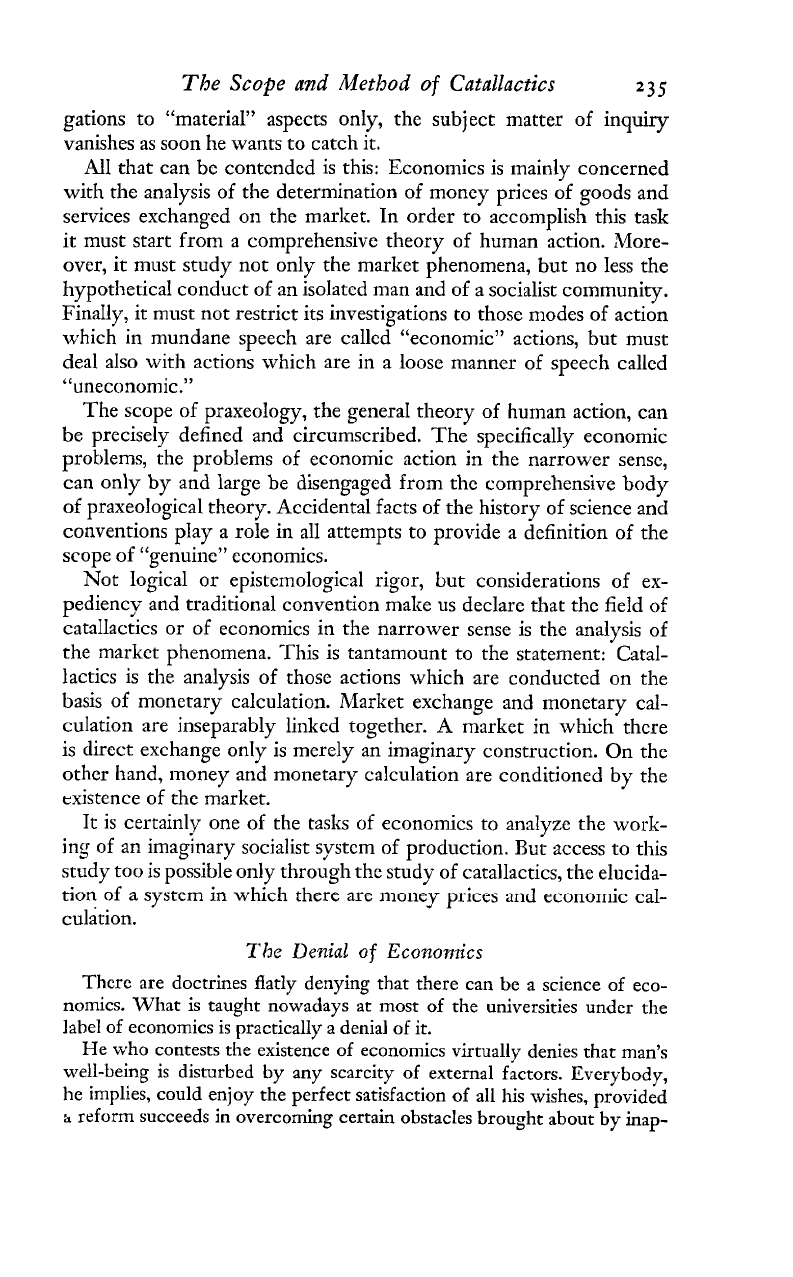
The
Scope
and
Method of Catallactics
235
gations to "material" aspects only, the subject matter of inquiry
vanishes as soon he wants to catch
it.
All that can be contended is this: Econon~ics is mainly concerned
with the analysis of the determination of money prices of goods and
services exchanged on the market. In order to accomplish this task
it must start from a comprehensive theory of human action. More-
over, it must study not only the market phenomena,
but
no less the
hypothetical conduct of an isolated man and of a socialist community.
Finally, it must not restrict its investigations to those modes of action
which in mundane speech are called "economic" actions, but must
deal also with actions which are in a loose manncr of speech called
'L~ne~on~nli~."
The scope of praxeology, the genera1 theory of human action, can
be precisely defined and circumscribed. The specifically economic
problems, the problems of economic action in the narrower sense,
can only by and large be disengaged from the comprehensive body
of praxeological theory. Accidental facts of the history of science and
conventions play a role in all attempts to provide a definition of the
scope of "genuine" economics.
Not logical or epistemological rigor, but considerations of ex-
pediency and traditional convention make us declare that the field of
cataIlactics or of economics in the narrower sense is the analysis of
the market phenomena. This is tantamount to the statement: Catal-
lactics is the analysis of those actions which are conductcd on the
basis of monetary calculation. Market exchange and monetary cal-
culation are inseparably linked together.
A
market in which there
is direct exchange only is merely an imaginary construction. On the
other hand, money and monetary calculation are conditioned by the
existence of the market.
It
is
certainly one of the tasks of economics to analyze the work-
ing of an imaginary socialist systcm of production. Rut access to this
study too is possible only through the study of catallactics, the elucida-
tion
of
a systcm in which there are money prices and economic cal-
culation.
The
Denial
of
Econonzics
There are doctrines flatly denying that there can
be
a
science of eco-
nomics. What is taught nowadays
at
most of the universities under the
label of economics is practically
a
denial of it.
He who contests the existence of economics virtually denies that man's
well-being is disturbed by any scarcity of external factors. Everybody,
he implies, could enjoy the perfect satisfaction
of
all his wishes, provided
a
reform succeeds in overcoming certain obstacles brought about by inap-
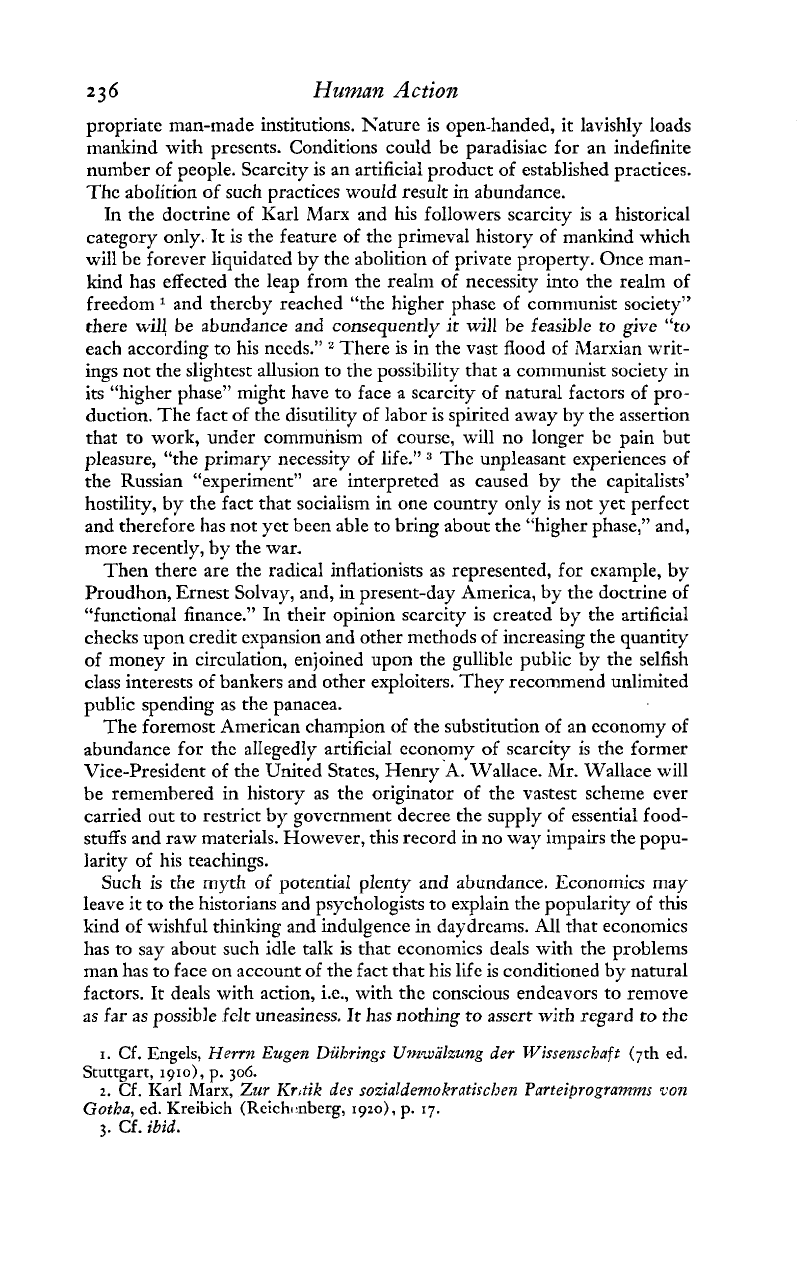
236
Human
Action
propriate man-made institutions. h'ature is open-handed, it lavishly loads
mankind with presents. Conditions could be paradisiac for an indefinite
number of people. Scarcity is an artificial product of established practices.
The abolition of such practices would result in abundance.
In the doctrine of Karl Marx and his followers scarcity is a historical
category only. It is the feature of the primeval history of mankind which
will be forever liquidated by the abolition of private property. Once man-
kind has effected the leap from the realni of necessity into the realm of
freedom and thereby reached "the higher phase of comniunist society"
there will be abundance and consequently it
will
he feasible to give "to
each according to his needs." There is
in
the vast flood of Marxian writ-
ings not the slightest allusion to the possibility that a communist society in
its "higher phase" might have to face a scarcity of natural factors of pro-
duction. The fact of the disutility of labor is spirited away by the assertion
that to work, under communism of course, will no longer be pain but
pleasure, "the primary necessity of life." The unpleasant experiences of
the Russian "experiment" are interpreted as caused
by
the capitalists'
hostility, by the fact that socialism in one country only is not yet perfect
and therefore has not yet been able to bring about the "higher phase," and,
more recently, by the war.
Then there are the radical inflationists as represented, for example, by
Proudhon, Ernest Solvay, and, in present-day America, by the doctrine of
"functional finance." In their opinion scarcity is created by the artificial
checks upon credit expansion and other methods of increasing the quantity
of money in circulation, enjoined upon the gullible public by the selfish
class interests of bankers and other exploiters. They recommend unlimited
public spending as the panacea.
The foremost American champion of the substjtution of an economy of
abundance for the aIIegedly artificial economy of scarcity is the former
Vice-president of the United States, Henry
A.
Wallace. 1Mr. Wallace will
be remembered in history as the originator of the vastest scheme ever
carried out to restrict by government decree the supply of essential food-
stuffs and raw materials. However, this record in no way impairs the popu-
larity of his teachings.
Such is the myth of potential plenty and abundance. Economics may
leave it to the historians and psychologists to explain the popularity of this
kind of wishful thinking and indulgence in daydreams. All that economics
has to say about such idle talk is that economics deals with the problems
man has to face on account of the fact that his life is conditioned by natural
factors. It deals with action, i.e., with the conscious endeavors to remove
as far as possible felt uneasiness.
It
has nothing to assert with regard to the
I.
Cf.
Engels,
Herrn Eugen Duhrtngs Umwalzung der Wissenschaft
(7th ed.
Stuttgart,
I~IO),
p.
306.
2.
Cf.
Karl Marx,
Zur Kritik des sozialdenzokratiscben Parteiprogra?nms con
Gotha,
ed. Kreibich (Rekhanberg,
~gzo),
p.
17.
3.
Cf.
ibid.
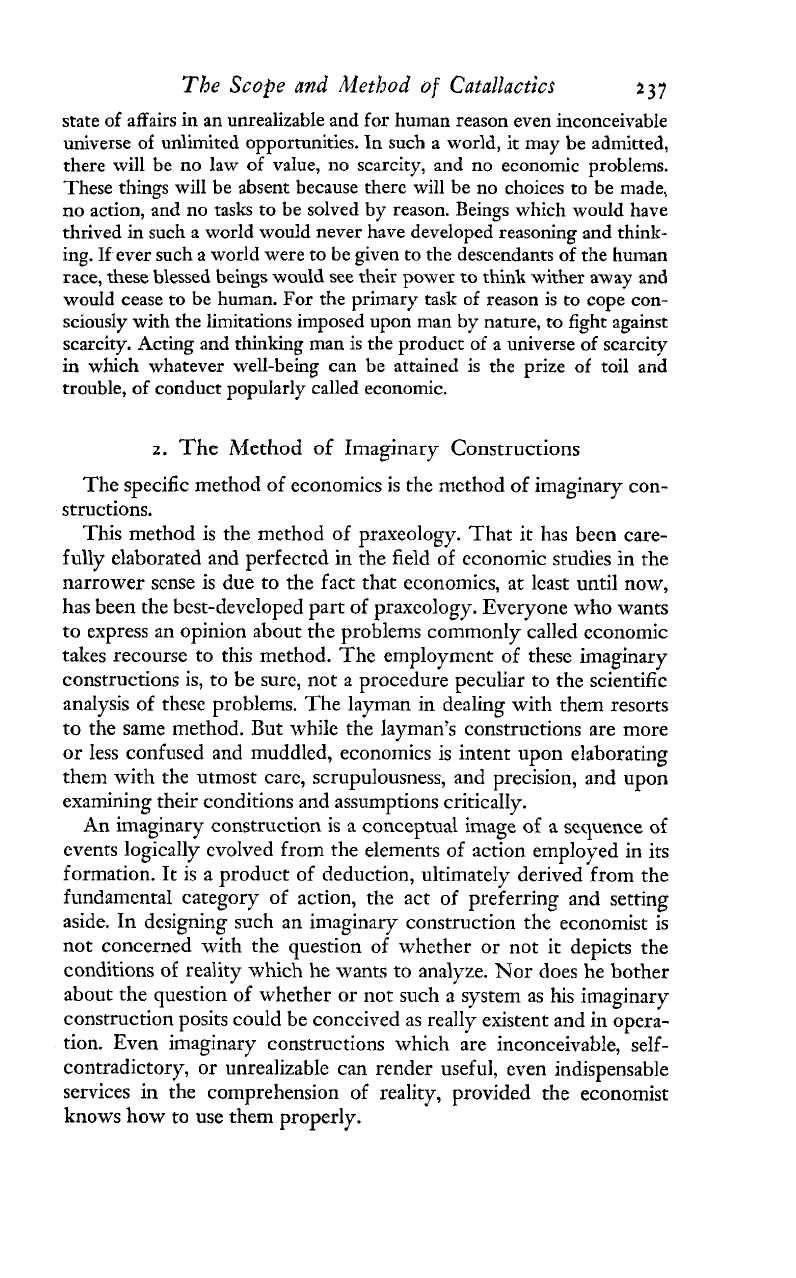
The
Scope
and
Method of Catallactics
237
state of affairs in an unrealizable and for human reason even inconceivable
universe of unlimited opportunities.
In
such a world, it may be admitted,
there will be no law of value, no scarcity, and no economic problems.
These things will be absent because there will be no choices
to
be made,
no action, and no tasks to be solved by reason. Beings which would have
thrived
in
such a world would never have developed reasoning and think-
ing.
If
ever such
a
world were to be given to the descendants of the human
race, these blessed beings would see their power to think wither away and
would cease to be human. For the primary task
of
reason is to cope con-
sciously with the limitations imposed upon man by nature, to fight against
scarcity. Acting and thinking man
is
the product of a universe of scarcity
in which whatever well-being can be attained is the prize of toil and
trouble, of conduct popularly called economic.
2.
The
Method of
Imaginary
Constructions
The specific method of economics is the method of imaginary con-
structions.
This method is the method of praxeology. That it has been care-
fully elaborated and perfectcd in the field of economic studies in the
narrower sense is due to the fact that economics, at least until now,
has been the best-developed part of praxcology. Everyone who wants
to express an opinion about the problems commonly called economic
takes recourse to this method. The employment of these imaginary
constructions is, to be sure, not a procedure peculiar to the scientific
analysis of these problems. The layman in dealing with them resorts
to the same method. But while the layman's constructions are more
or less confused and muddled, economics is intent upon elaborating
them with the utmost care, scrupulousness, and precision, and upon
examining their conditions and assumptions critically.
An imaginary construction is a conceptual image of
a
sequence
of
cvents logically evolved from the elements of action employed in its
formation. It is a product of deduction, ultimately derived from the
fundamental category of action, the act of preferring and setting
aside. In designing such an imaginary construction the economist is
not concerned with the question of whether or not it depicts the
conditions of reality which
he
wants to analyze. Nor does he bother
about the question of whether or not such a system as his imaginary
construction posits could be conceived as really existent and in opera-
tion. Even imaginary constructions which are inconceivable, self-
contradictory, or unrealizable can render useful, even indispensable
services in the comprehension of reality, provided the economist
knows
how
to use them properly.
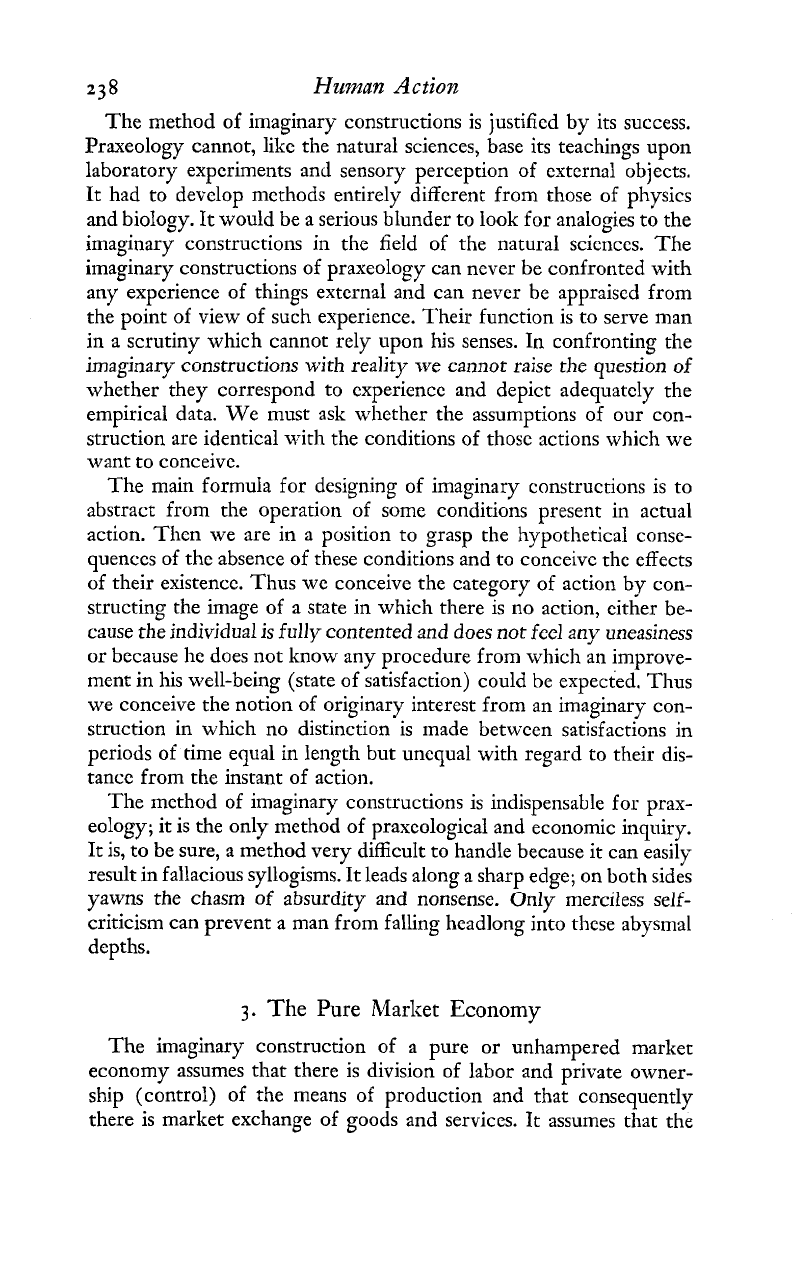
238
Human
Action
The method of imaginary constructions is justificd by its success.
Praxeology cannot, likc the natural sciences, base its teachings upon
laboratory experiments and sensory perception of cxternal objects.
It had to develop methods entirely different from those of physics
and biology. It would be a serious blunder to look for analogies to the
imaginary constructions in the field of the natural sciences. The
imaginary constructions of praxeology can never be confronted with
any expcrience of things external and can never be appraised from
the point of view of such experience. Their function is to serve man
in a scrutiny which cannot rely upon his senses.
In
confronting the
imaginary constructions with reality we cannot raise
the
question of
whether they correspond to cxperiencc and depict adequatcly the
empirical data. We must ask whether the assumptions of our con-
struction are identical uith the conditions of those actions which we
want to conceivc.
The main formula for designing of imaginary constructions is to
abstract from the operation of some conditions present in actual
action. Then we are in a position to grasp the hypothetical conse-
quences of the absence of these conditions and to conceive the effects
of their existence. Thus wc conceive the category of action by con-
structing the image of a state in which there is no action, cither be-
cause the individual is fully contented and does not feel any uneasiness
or because he does not know any procedure from which an improve-
ment in his well-being (state of satisfaction) could be expected. Thus
we conceive the notion of originary interest from an imaginary con-
struction in which no distinction is made betwccn satisfactions in
periods of time equal in length but unequal with regard to their dis-
tance from the instant of action.
The rncthod of imaginary constructions is indispensable for prax-
eology; it is the only method of praxcological and economic inquiry.
It
is, to be sure, a method very difficult to handle because it can easily
result in fallacious syllogisms. It leads along a sharp edge; on both sides
yawns the chasm of absurdity and nonsense. Only merciless self-
criticism can prevent a man from falling headlong into these abysmal
depths.
3.
The Pure Market Economy
The imaginary construction of a pure or unhampered marker
economy assumes that there is division of labor and private owner-
ship (control) of the means of production and that consequently
there is market exchange of goods and services. It assumes that the
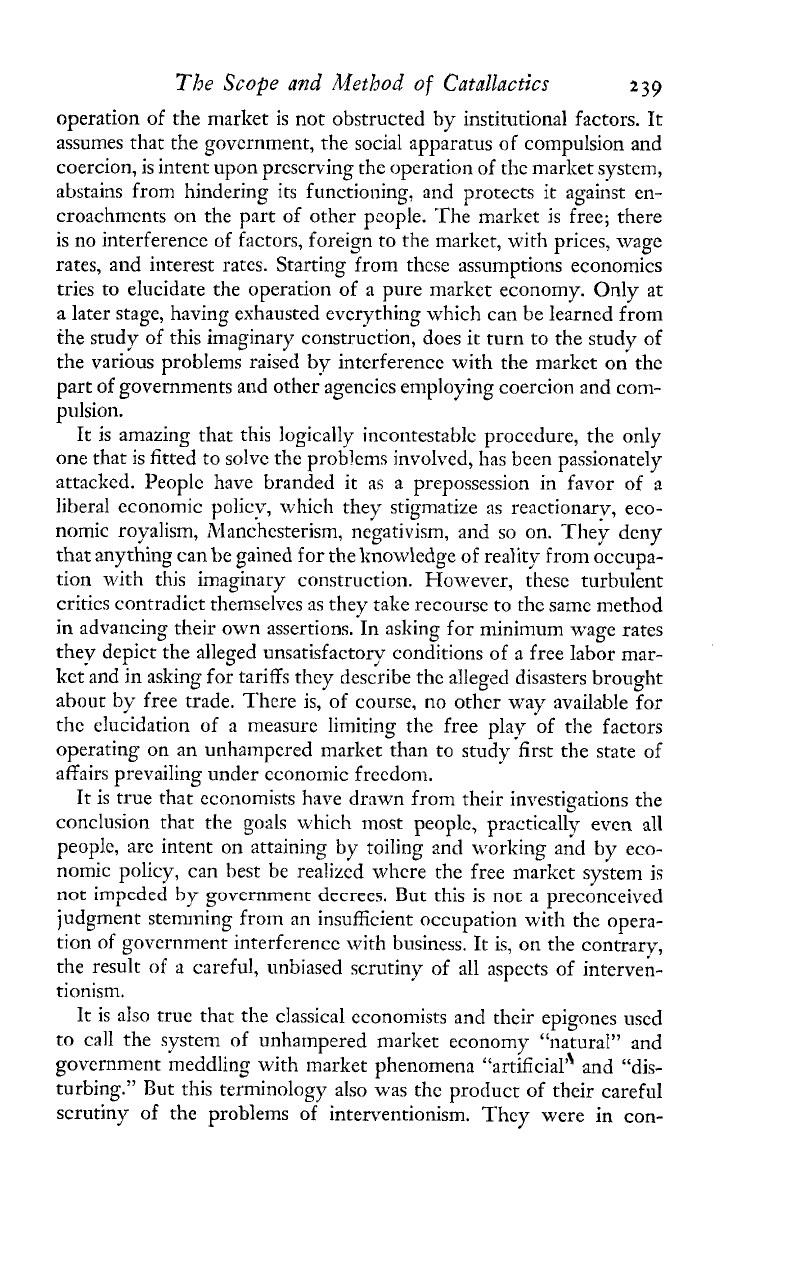
The
Scope
and
Method
of
Catallactics
2
39
operation of the market is not obstructed by institutional factors. It
assumes that the government, the social apparatus
of
compulsion and
coercion, is intent upon preserving the operation of thc market system,
abstains from hindering its functioning, and protects it against en-
croachments on the part of other people. The market is free; there
is no interference of factors, foreign to the market, with prices, wage
rates, and interest rates. Starting from thcse assumptions economics
tries to elucidate the operation of a pure market economy. Only at
a later stage, having exhausted everything which can be learned from
the study of this imaginary construction, does it turn to the study of
the various problems raised
by
interference with the markct on the
part of governments and other agencies employing coercion and corn-
pulsion.
It is amazing that this logically incontestable procedure, the only
one that is fitted to solve the problems involved, has been passionately
attacked. Yeoplc have branded it as a prepossession in favor of a
liberal economic policy, which they stigmatke as reactionary, eco-
nomic royalism, &lanchcsterism, negativism, and so on. They deny
that anything can be gained for the Imovdedge of reaXty from occupa-
tion with this imaginary construction. However, these turbulent
critics contradict thernsclves as they take recourse to the same method
in advancing their own assertions. In asking for minimum wage rates
thev depict the alleged unsatisfactory conditions of a free labor mar-
kctand in asking for tariffs they describe the alleged disasters brought
about
by
free trade. There is, of course, no other way available for
the elucidation of a measure limiting the free play of the factors
operating on an unhampered market than to study first the state of
affairs prevailing under cconomic freedom.
It is true that economists have drawn from their investigations the
conclusion that the goals which most people, practically even all
people, are intent on attaining by toiling and working and by eco-
nomic policy, can best be realized where the free market system is
not impcded hy govcrnment decrees. But this is
not
a preconceived
judgment stemming from
an
insufficient occupation with the opera-
tion of government interference with business. It is, on the contrary,
the result
of
a careful, unbiased scrutiny of all aspccts of interven-
tionism.
It is also true that the classical economists and their epigones used
to call the system of unhampered market economy "naturaIn and
government meddling with market phenomena "artificial" and "dis-
turbing." Rut this terminology also was the product of their careful
scrutiny of the problems of interventionism. They were in con-
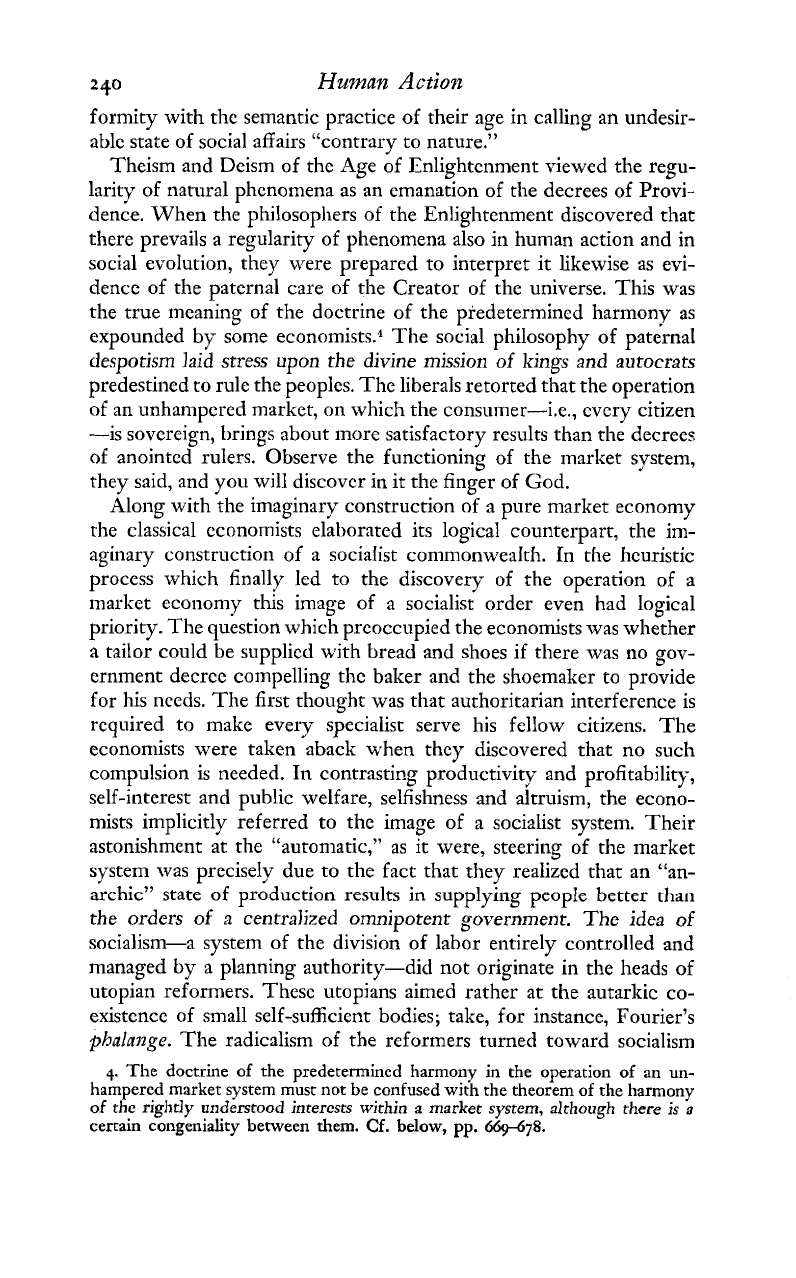
240
Human
Action
formity with the semantic practice of their age in calling an undesir-
able
state of social affairs "contrary to nature."
Theism and Deism of the Age of Enlightenment viewed the regu-
larity of natural phenomena as an emanation of the decrees of Provi-
dence. When the philosophers of the Enlightenment discovered that
there prevails a regularity of phenomena also in human action and in
social evolution, they were prepared to interpret it likewise as evi-
dence of the patcrnal care of the Creator of the universe. This was
the true meaning of the doctrine of the predetermined harmony as
expounded by some
economist^.^
The social philosophy of patkrnal
despotism laid stress upon the divine mission of kings and autocrats
predestined to rule the peoples. The liberals retorted that the operation
of an unhampered market, on which the consumer-it., every citizen
-is sovereign, brings about more satisfactory results than the decrees
of anointed rulers. Observe the functioning of the market system,
they said, and you will discover in it the finger of God.
Along with the imaginary construction of a pure market economy
the classical economists elaborated its logical counterpart, the im-
aginary construction of a socialist commonwealth. In the heuristic
process which finally led to the discovery of the operation of a
market economy this image of a socialist order even had logical
priority. The question which preoccupied the economists was whether
a
tailor could be supplied with bread and shoes if there was no gov-
ernment decree compelling the baker and the shoemaker to provide
for his needs. The first thought was that authoritarian interference is
required to make every specialist serve his fellow citizens. The
economists were taken aback when they discovered that no such
compulsion is needed. In contrasting productivity and profitability,
self-interest and public welfare, selfishness and altruism, the econo-
mists implicitly referred to the image of a socialist system. Their
astonishment at the "automatic," as it were, steering of the market
system was preciseIy due to the fact that they realized that an "an-
archic" state of production results
in
supplying people better than
the orders of a centralized omnipotent government.
The
idea of
socialism-a system of the division of labor entirely controlled and
managed
by
a planning authority-did not originate in the heads of
utopian reformers. These utopians aimed rather at the autarkic co-
existence of small self-sufficient bodies; take, for instance, Fourier's
phalange.
The radicalism of the reformers turned toward socialism
4.
The doctrine of the predetermined harmony in the operation of an un-
hampered market system must not be confused
with
the theorem of the harmony
of the rightly understood interests within
a
market system, although there
is
a
certain congeniality between them.
Cf.
below,
pp.
669-678.
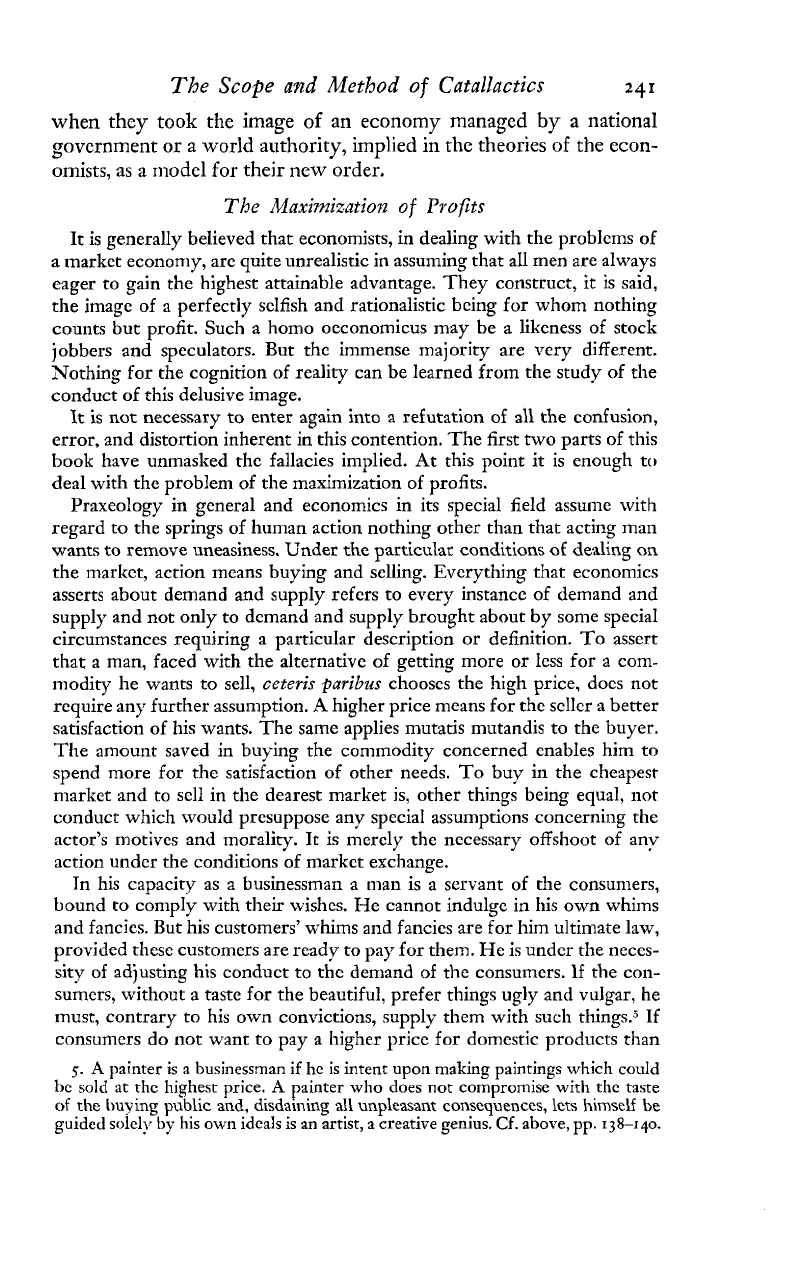
The
Scope and
Method
of Catallactics
when thcy took the image of an economy managed
by
a national
government or a world authority, implied in rhe theories of the econ-
omists, as a model for their new order.
The
M~ximizatio?~
of
Profits
It is generally believed that economists, in dealing with the problems of
a tnarket economy, are quite unrealistic in assuming that all men are always
eager to gain the highest attainable advantage. They construct, it is said,
the image of a perfectly selfish and rationalistic being for whom nothing
counts but ~rofit. Such a homo oeconomicus may be a likeness of stock
jobbers and speculators. But the immense majority are very different.
Nothing for the cognition of reality can be learned from the study of the
conduct of this delusive image.
It
is not necessary to enter again into a refutation of all the confusion,
error, and distortion inherent in this contention. The first two parts of this
book have unmasked the fallacies implied. At this point it is enough to
deal with the problem of the maximization of profits.
Praxeology in general and economics in its special field assume with
regard to the springs of human action nothing other than that acting man
wants to remove uneasiness. Under the particular conditions
of
dealing
on
the market, action means buying and selling. Everything that economics
asserts about demand and supply refers to every instance of demand and
supply and not only to demand and supply brought about by some special
circumstances requiring a particular description or definition. To assert
that a man, faced with the alternative of getting more or Iess for a com-
modity he wants to sell,
ceteris paribus
chooses the high price, does not
require any further assunlption. A higher price means for the seller a better
satisfaction of his wants. The same applies mutatis mutandis to the buyer.
The amount saved in buying the commodity concerned enables him to
spend more for the satisfaction of other needs. To buy in the cheapest
market and to sell in the dearest market is, other things being equal, not
conduct which would presuppose any special assumptions concerning the
actor's motives and morality.
It
is merely the necessary offshoot of any
action under the conditions of market exchange.
In his capacity as a businessman a man is a servant of the consumers,
bound to conlply with their wishes. He cannot indulge in his own whims
and fancies. But his customers' whims and fancies are for him ultimate law,
provided these customers are ready to pay for them. He is under the neces-
sity of adjusting his conduct to the demand of the consumers.
If
the con-
sumers, without a taste for the beautiful, prefer things ugly and vulgar, he
must, contrary to his own convictions, supply them with such things.5 If
consumers do not want to pay a higher price for domestic products than
5.
A
painter
is
a
businessman if he is intent upon making paintings which could
be
sold
at
the highest price.
A
painter who does not compromise with
the
taste
of
the
buving
public
and,
disdaining dl unpleasant consequences, lets himself
be
guided solely
by
his own ideals is
an
artist,
a
creative genius.
Cf.
above, pp.
I
38-1
40.
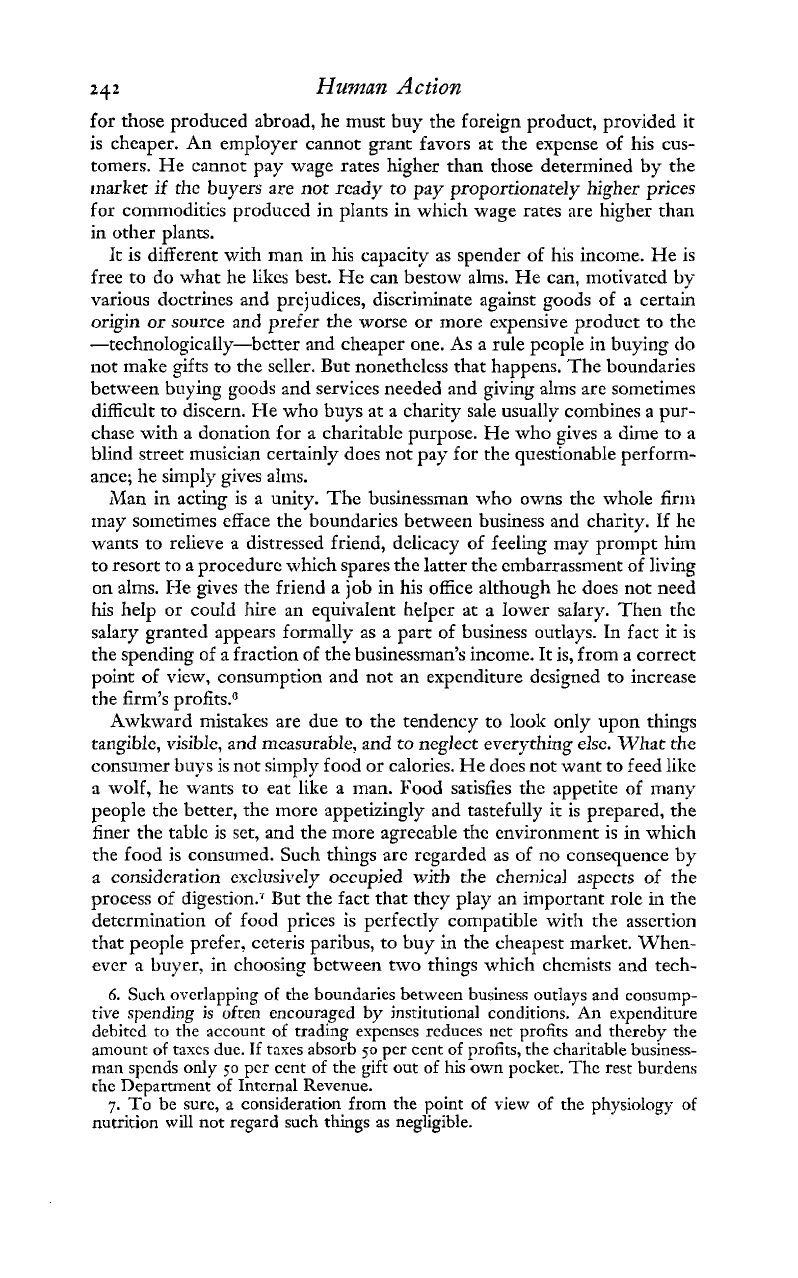
242
Human
Action
for those produced abroad, he must buy the foreign product, provided it
is cheaper. An employer cannot grant favors at the expense of his cus-
tomers. He cannot pay wage rates higher than those determined by the
market if the buyers are not ready to pay proportionately higher prices
for comnlodities produced in plants in which wage rates are higher than
in other plants.
It is different with man in his capacity as spender of his income. He
is
free to do what he likes best. He can bestow alms. He can, motivated by
various doctrines and prcjudices, discriminate against goods of
a
certain
origin or source and prefer the worse or more expensive product to the
-technoIogically-better and cheaper one. As a rule pcople in buying do
not make gifts to the seller. But nonetheless that happens. The boundaries
between buying goods and services needed and giving alms are sometimes
difficult to discern. He who buys at a charity sale usually combines a pur-
chase with a donation for a charitable purpose. He who gives a dime to a
blind street musician certainly does not pay for the questionable perform-
ance; he simply gives alms.
lMan in acting is a unity. The businessman who owns the whole firm
may sometimes efface the boundaries between business and charity. If he
wants to relieve
a
distressed friend, delicacy of feeling may prompt him
to resort to a procedure which spares the latter the embarrassment of living
on alms.
I-Te
gives the friend a job in his office although he does not need
his help or could hire an equivalent helper at a lower salary. Then thc
salary granted appears formally as a part of business outlays. In fact it is
the spending of a fraction of the businessman's income. It is, from a correct
point of view, consumption and not an expenditure designed to increase
the firm's pr~fits.~
Awkward mistakes are due to the tendency to look only upon things
tangible, visible, and rncasurable. and to neglect everything else. What the
consumer buys is not simply food or calories. He does not want to feed like
a wolf, he wants to eat like
a
man. Food satisfies the appetite of many
people the better, the morc appetizingly and tastefully it is prepared, the
finer the table is set, and the more agreeable the environment is in which
the food is consumed. Such things are regarded as of
no
consequence by
a consideration exclusirdy occupied with the chernjcal aspects of rhe
process of digestion.7 But the fact that they play an important role in the
determination of food prices is perfectly compatible with the assertion
that people prefer. ceteris paribus, to buy in the cheapest market. When-
ever
a
buyer. in choosing between two things which chemists and tech-
6.
Such overlapping of the boundaries between business outlays and consump-
tive spending is vfren encouraged by jnstitutional conditions. An expenditure
debited to the account of trading expenses reduces net profits and thereby the
amount of taxes due. If taxes absorb
50
per cent of profits, the charitable business-
man spends only
50
per cent of the gift out of his own pocket.
The
rest burdens
the Department of Internal Revenue.
7.
To be sure,
a
consideration from the point of view of the physiology of
nutrition
will
not regard such things as negligible.
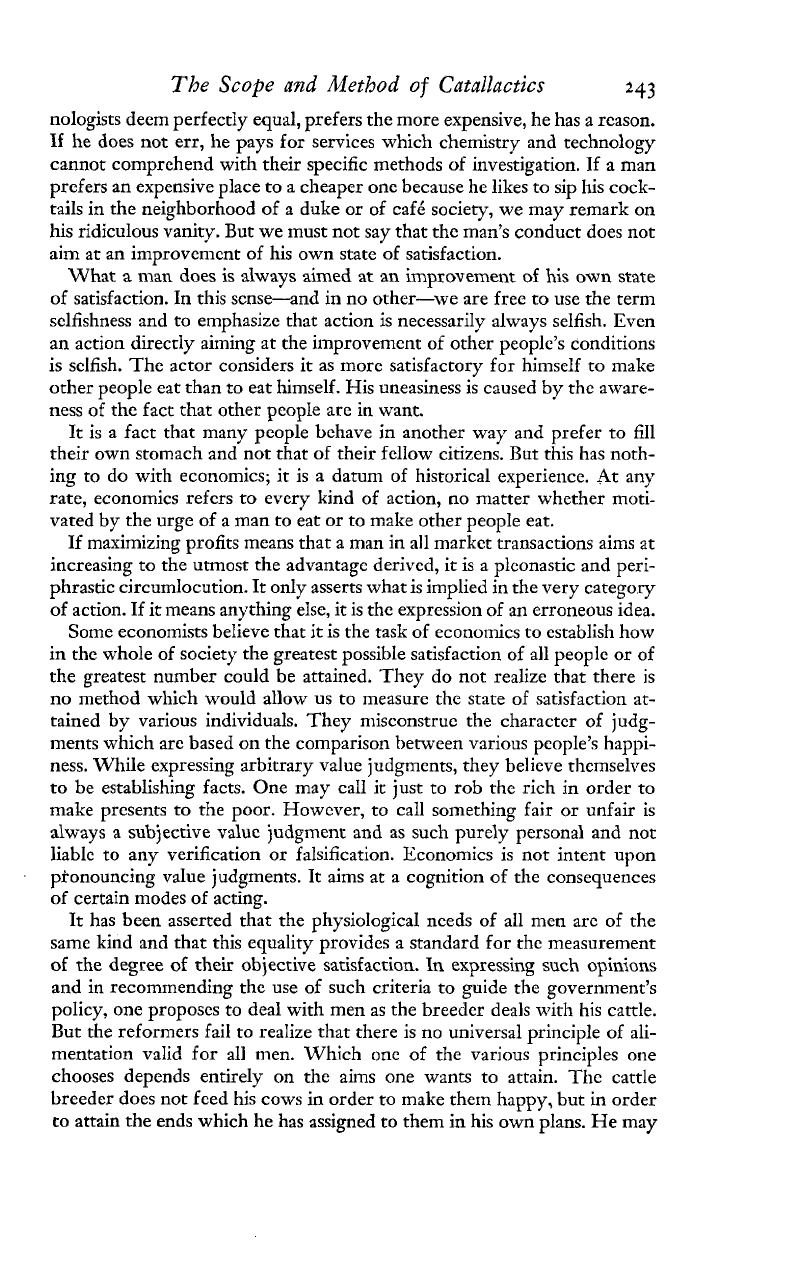
The Scope and Method
of
Catallactics
nologists deem perfectly equal, prefers the more expensive, he has a reason.
If
he does not err, he pays for services which chemistry and technology
cannot comprehend with their specific methods of investigation. If a man
prefers an expensive place to a cheaper one because he likes to sip his cock-
tails in the neighborhood of a duke or of cafC society, we may remark on
his ridiculous vanity. But we must not say that the man's conduct does not
aim at an improvenlent of his own state of satisfaction.
What
a
man does is always aimed at an improvement
of
his own state
of satisfaction. In this scnse-and in no other-we are free to use the term
selfishness and to emphasize that action is necessarily always selfish. Even
an action directly aiming at the improvement of other people's conditions
is selfish. The actor considers
it
as more satisfactory for himself to make
other people eat than to eat himself. His uneasiness is caused by the aware-
ness of the fact that other people are in want.
It is a fact that many people behave in another way and prefer to fill
their own stomach and not that of their fellow citizens. But this has noth-
ing to do with economics; it is a datum of historical experience. At any
rate, economics refers to every kind of action, no matter whether moti-
vated by the urge of a man to eat or to make other people eat.
If maximizing profits means that a man in all market transactions aims at
increasing to the utmost the advantage derived, it is a pleonastic and peri-
phrastic circumlocution. It only asserts what is implied in the very category
of action. If it means anything else, it is the expression of an erroneous idea.
Some economists believe that it is the task of economics to establish how
in the whole of society the greatest possible satisfaction of all people or of
the greatest number could be attained. They do not realize that there is
no method which would allow us to measure the state of satisfaction at-
tained by various individuals. They n~isconstruc the character of judg-
ments which arc based on the comparison between various people's happi-
ness. While expressing arbitrary value judgments, they believe themselves
to be establishing facts. One may caIl it: just to rob thc rich in order to
make presents to the poor. However, to call something fair or unfair is
always a subjective value judgment and as such purely personal and not
liable to any verification or falsification. Economics is not intent upon
pronouncing value judgments. It aims at a cognition of the consequences
of certain modes of acting.
It has been asserted that the physiological needs of all men arc of the
same kind and that this equality provides a standard for the measurement
of
the degree
of
their objective satisfaction. In expressing such opinions
and in recommending the use of such criteria to guide the government's
policy, one proposes to deal with men as the breeder deals with his cattle.
But the reformers fail to reaIize that there is no universal principle of ali-
mentation valid for all men. Which one of the various principles one
chooses depends entirely on the aims one wants to attain. The cattle
breeder does not feed his cows in order to make them happy, but in order
to
attain the ends which he has assigned to them
in
his own plans.
He
may
